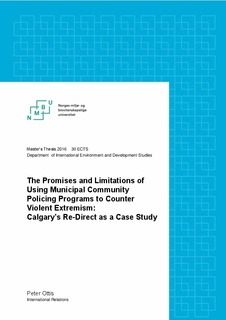| dc.description.abstract | The mobilization of Western foreign fighters to join the Islamic State of Iraq and Syria (ISIS) has left governments in many countries searching for the most appropriate response. Calgary, Alberta in Western Canada has not been immune to this issue. On top of deploying ‘hard’ approaches (law enforcement and intelligence), Calgary has also embraced the ‘softer’ measures of early intervention and radicalization prevention. The latter category of programs is often labelled ‘countering violent extremism’ (CVE). This thesis examines one such CVE program – ReDirect – launched in September 2015 by the Calgary Police Service. ReDirect was chosen as a case study because it is the first dedicated municipal level, community policing, radicalization prevention program in Canada. The objective of this research project is to fill the gap in literature on Canadian municipal-level CVE programming. The study’s findings are largely based on fourteen interviews with people with in-depth knowledge of the program, which were conducted primarily during fieldwork in Calgary, Alberta in spring 2016.
The study finds that Canada’s framing of CVE as a national security issue results in an “intervention gap” on the radicalization continuum. Due to a combination of legislative, judicial, operational, strategic and political hurdles, none of the federal agencies working on CVE – the Canadian Security Intelligence Service, the Royal Canadian Mounted Police and Public Safety Canada – are able to intervene in early stages of radicalization. Municipal-level programs such as ReDirect provide one way to fill this critical gap. Calgary Police’s adoption of lessons learned from similar programs, its previous successes in community policing and the community’s buy-in suggest that ReDirect may work in reducing radicalization. However, the program also faces limitations. Given the localized nature of ReDirect, the primary determinant of whether a person can access its services is not their need but their postal code. Applying Nesser’s typology of a terror cell reveals that ReDirect will likely only work on a sub-set of individuals vulnerable to violent extremism. Of the four types suggested by Nesser (entrepreneurs, protégés, misfits and drifters), ReDirect would only succeed with the latter two. While ReDirect is the first program of its kind in Canada, its framework may not serve as an appropriate model for other jurisdictions to follow. ReDirect’s signature feature – the central role of police as a convenor of government and civil society groups – works in Calgary because of several unique characteristics and may not necessarily prove suitable for other municipalities looking to create a similar program. | nb_NO |

